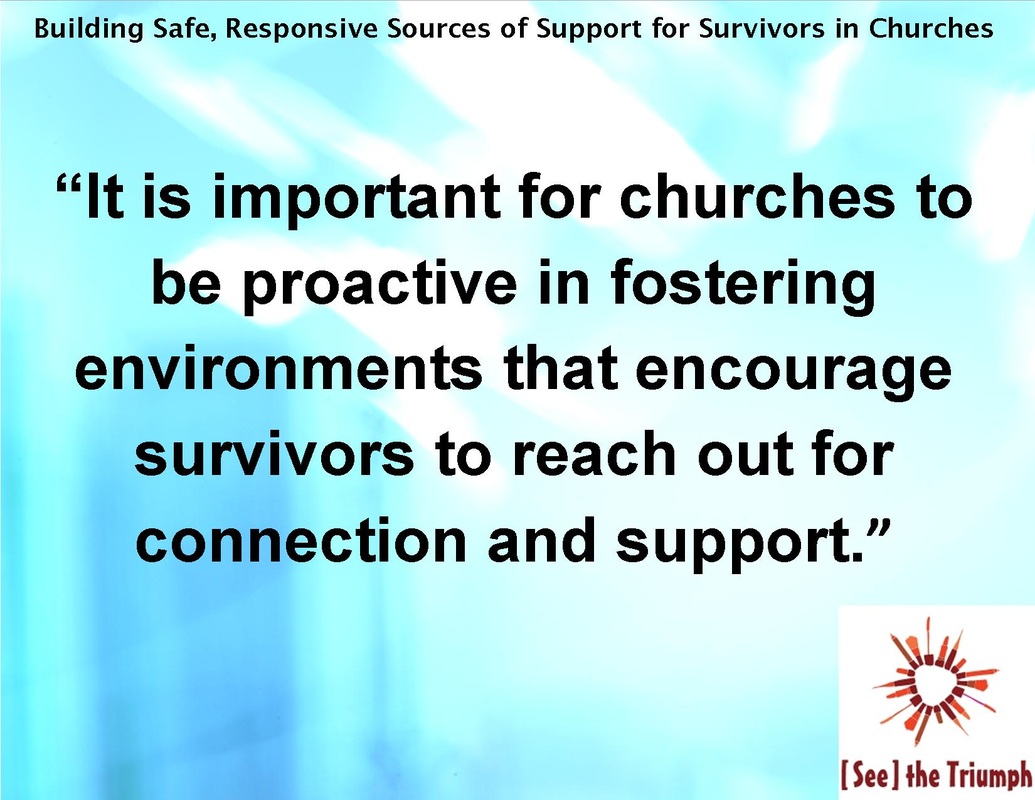|
By Christine Murray, See the Triumph Co-Founder
Many people view their faith communities as a major source of social support and connection in their lives. For many, a faith community can even come to feel like a second family, which shows just how deeply valued these connections can be for people of faith. On the positive side, the strength of these social connections offers a potentially valuable source of support for survivors, including those currently experiencing abusive relationships. This support can be practical (e.g., providing transportation or housing), emotional (e.g., providing validation when telling one’s story), moral (e.g., coming to court hearings to support a survivor), and spiritual (e.g., prayer and spiritual encouragement). Unfortunately, however, some of the survivors in our research faced isolation, separation, and loss of status within their church communities after others found out about the abuse they experienced. Consider, for example, the following quotes:
It’s important to note that faith communities often have sub-groups and different social networks within the larger congregation. Therefore, it is possible that survivors of intimate partner violence may find that some segments of their communities are more or less isolating than others. It certainly is possible that the survivors quoted above encountered smaller segments of a population that did not represent the beliefs of the larger group or the leadership of the faith communities. However, social isolation is an important issue for leaders and members of congregations who want to ensure that their faith communities are welcoming and supportive to survivors of abuse. It is important to consider how every level of faith communities can offer a consistently supportive environment to members and others who seek help for abuse. Faith communities offer a potentially valuable source of social support and connection for survivors of intimate partner violence. However, survivors may feel isolated and unwelcome if they encounter stigmatizing reactions within their faith communities. Therefore, it is important for churches to be proactive in fostering environments that encourage survivors to reach out for connection and support.
Brandon
3/6/2014 05:48:11 am
I appreciate the message and also look forward to seeing ways in which your research and advocacy efforts will hopefully call similar attention to the stigma of Intimate Partner Violence in schools, higher education, hospitals, the government, and society.
Christine Murray
3/6/2014 07:30:13 am
Thanks for your comment, Brandon! We definitely heard from survivors in our research about stigma they faced from many areas. It's complicated issue that requires a complicated and comprehensive response.
Brandon
3/6/2014 08:30:00 am
I am curious about the depth and complexity of this project (I'm very interested in the many layers embedded within your data) !! I can imagine your data is immense and has clearly led you to identify the five (if not more) communities to include "neighborhoods, workplaces or schools, religious or community organizations, cultural groups, and even online social networks." Is there a way for me to "follow" what your group posts about your findings across all of these communities in order to become more informed within the context of my "communities" in which I belong to?
Christine Murray
3/6/2014 12:31:14 pm
More good thoughts, Brandon. The best way to follow our posts is to check back with our blog, and you can connect on Facebook here: https://www.facebook.com/seethetriumph. Each month this year, we are focusing on a specific theme, and then at the end of the month launching a Collection around that theme. We hope you'll find those helpful!
Brandon
3/6/2014 08:30:42 am
I am curious about the depth and complexity of this project (I'm very interested in the many layers embedded within your data) !! I can imagine your data is immense and has clearly led you to identify the five (if not more) communities to include "neighborhoods, workplaces or schools, religious or community organizations, cultural groups, and even online social networks." Is there a way for me to "follow" what your group posts about your findings across all of these communities in order to become more informed within the context of my "communities" in which I belong to?
Brandon
3/6/2014 08:31:28 am
I am curious about the depth and complexity of this project (I'm very interested in the many layers embedded within your data) !! I can imagine your data is immense and has clearly led you to identify the five (if not more) communities to include "neighborhoods, workplaces or schools, religious or community organizations, cultural groups, and even online social networks." Is there a way for me to "follow" what your group posts about your findings across all of these communities in order to become more informed within the context of my "communities" in which I belong to?
Brandon
3/6/2014 08:32:04 am
I am curious about the depth and complexity of this project (I'm very interested in the many layers embedded within your data) !! I can imagine your data is immense and has clearly led you to identify the five (if not more) communities to include "neighborhoods, workplaces or schools, religious or community organizations, cultural groups, and even online social networks." Is there a way for me to "follow" what your group posts about your findings across all of these communities in order to become more informed within the context of my "communities" in which I belong to?
brandon
3/6/2014 08:34:13 am
sorry...i kept getting an error message that mine wasnt posting! Comments are closed.
|
Archives
July 2024
CategoriesAll About Intimate Partner Violence About Intimate Partner Violence Advocacy Ambassadors Children Churches College Campuses Cultural Issues Domestic Violence Awareness Month Financial Recovery How To Help A Friend Human Rights Human-rights Immigrants International Media Overcoming Past Abuse Overcoming-past-abuse Parenting Prevention Resources For Survivors Safe Relationships Following Abuse Schools Selfcare Self-care Sexual Assault Sexuality Social Justice Social-justice Stigma Supporting Survivors Survivor Quotes Survivor-quotes Survivor Stories Teen Dating Violence Trafficking Transformative-approaches |
Search by typing & pressing enter



 RSS Feed
RSS Feed